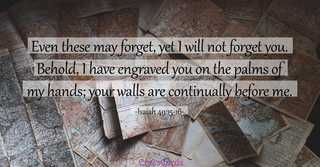
- Recent Translations
- All Translations
Yeshayah 49:20
Share
Settings
Images for Yeshayah 49:20

Yeshayah 49:20 Meaning and Commentary
The children which thou shalt have, after thou hast lost the
other
Which "other lost" are not the Jews, the broken branches, rejected and cut off for unbelief; and the "children after" them not the Gentiles converted, which took their place; but "the other" are such who have been destroyed by the Heathen persecutions, and especially by the antichristian cruelties; and the "children after", the great numbers of converts upon the fall of antichrist. The words may be rendered, "the children of thine orbity" F15, or "childless state"; such as were born unto her in an uncommon, extraordinary, and unexpected way, when the church seemed to be in a widowhood estate, or like a woman that is past bearing children: shall say again in thine ears;
or, "shall yet say" F16; that is, hereafter, in time to come: for this is a prophecy of what should be said in the church's hearing, and such as had never been said before; and therefore improperly rendered "again"; for there never has been as yet such a time as this, or such a large number of converts, as to say, the place is too strait for me to dwell in;
there is not room enough for us, as in ( 2 Kings 6:1 ) : give place to me that I may dwell;
one and another of the children or converts should say, make room for me, that I may have a name and a place among you, and dwell with you, and abide in the house of the Lord, and partake of the privileges and ordinances of it: but the word used signifies drawing nigh, and not giving way or removing; and should rather be rendered, "draw nigh to me that I may dwell"; or "and I shall dwell" F17, or "sit"; come close to one another, and we shall all sit and dwell comfortably together; just as when a house is well filled with agreeable company, and there is an unwillingness to part with or lose any, they are desired to sit close together, that there may be room for all: and this is, and will be, the case with the church and her members; they will be desirous to sit regularly, and close together, in Gospel order, that everyone may be comfortable, and partake of the benefit of communion, and none be obliged to depart: and to this sense Gussetius
F18 interprets the phrase.
F15 (Kylwkv ynb) "filii orbitatis tuae", Junius & Tremellius, Piscator, Vitringa; "orbitatum tuarum", Pagninus, Montanus; "tui orbati", Munster. (The word "orbity" means "childless" or "without parents", Webster's 1828 Dictionary, Editor)
F16 (wrmay dwe) "adhuc dicent", Gataker, Junius & Tremellius, Piscator, Vitringa. q} (hbvaw yl hvg) "accede mihi & habitabo", Montanus; "contrahe te mea causa ut sedeam", Cocceius.
F18 Ebr. Comment. p. 496.